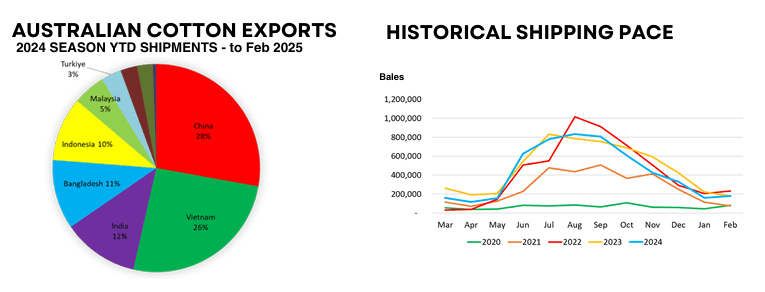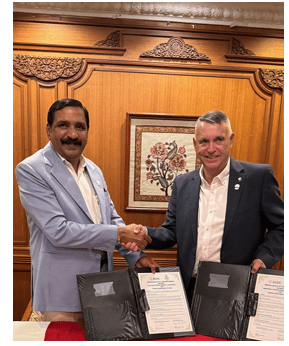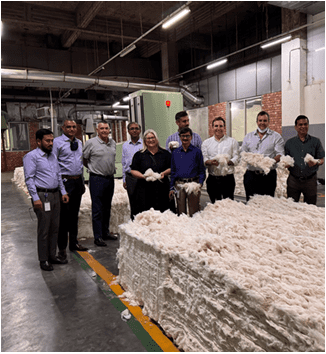UPDATE
I’m writing this month’s introduction from Dhaka, Bangladesh, at the conclusion of a highly successful ACSA visit to the subcontinent. Accompanied by our CEO Jules Willis, along with members Joel Hatherell and Shay Dhareula, we spent time in both India and Bangladesh visiting key customers and industry associations to promote the value of using Australian cotton in spinning operations.
Unsurprisingly, the recently announced US tariffs were a central topic of conversation. While there is understandable concern about the potential impact on global trade flows, we also encountered cautious optimism about the opportunities that may emerge as markets adapt. The true extent of these changes remains to be seen, but what’s clear is that the cotton trade, like all business, will adjust to the evolving landscape.
Despite the uncertainty, ICE futures have managed to remain above 60 cents, and combined with a weaker Australian dollar, gin prices have once again exceeded $600 per bale – a very encouraging outcome for Australian growers in the current climate.
Another major theme throughout our discussions was the importance of engaging directly with brands to promote the value of Australian cotton. ACSA will play a key role in supporting and amplifying this effort to ensure the role of merchants in the supply chain is well understood.
With ginning activity set to ramp up toward the end of April, and full-scale operations expected by early May, attention now turns to the 2025 crop. Let’s hope the weather remains favourable, allowing us to continue moving high-quality Australian cotton to our valued customers around the world.

ACSA STRENGTHENS TIES WITH INDIA & BANGLADESH
ACSA Members Cliff White, Joel Hatherell and Shay Dhareula and CEO Jules Willis have just completed an intensive eight-day industry engagement mission across India and Bangladesh, visiting key textile hubs including Coimbatore, Mumbai and Dhaka.
This strategic visit provided a valuable opportunity to strengthen relationships with key international partners, explore emerging market opportunities and witness firsthand the value and reputation of Australian cotton in the global supply chain.

ACSA Chair Cliff White and CAI President Atul
Ganatra at the signing of the MoU in Mumbai.
In India, the delegation engaged with leading agents, spinning mills and industry associations including Indian Cotton Federation and Southern India Mills’ Association. A major highlight was the signing of a Memorandum of Understanding with the Cotton Association of India, laying the groundwork for closer collaboration to strengthen trade ties and improve market access for Australian cotton.
Meetings with the Paul Murray, Australian Consul General; Kiran Karamil, Counsellor (Agriculture) Australian High Commission and Mary Overington, Trade & Investment Commissioner provided important context on broader Australia India trade relations, India’s current economic outlook and the potential implications of the recently announced US tariffs. Discussions also covered the dynamics of the local cotton market and future opportunities for Australian exports into the region.
The delegation then travelled to Dhaka, Bangladesh, connecting with Clinton Pobke, Deputy High Commissioner and Ben Carson, Trade & Investment Commissioner, Bangladesh Cotton Association, Bangladesh Textile Mills Association and key local agents. As one of the world’s fastest-growing textile manufacturing hubs, Bangladesh offers significant potential for expanded trade and partnership.

Viewing Australian cotton in laydown at Square Textiles.
Visits to spinning mills and garment factories showcased the full supply chain – from laydowns that included Australian cotton to finished garments – leaving the delegation impressed by the innovation and scale of production.
An Australian Cotton Seminar, hosted by Austrade in Dhaka, reinforced the value proposition of Australian cotton and the opportunities for increased trade into the market. The seminar was officially opened by the High Commissioner, HE Ms Susan Ryle, further cementing the importance of Australia-Bangladesh ties.
Our delegation’s visit reinforced both the unique value and growing demand for Australian cotton, recognised for its superior fibre length, strength, micronaire, grade, reliable classing and zero contamination. Building on the strong interest shown during our engagements, our focus moving forward will be on deepening collaboration, identifying new opportunities for partnership, and supporting increased uptake of Australian cotton. Our sincere thanks to Austrade India and Bangladesh for their invaluable support, which played a key role in the success of our visit.
MEET YOUR SUPPLY CHAIN PARTNER
 Founded over 35 years ago, Olam began in Nigeria and has grown into a leading global food and agri-business with global expertise across major food and agricultural value chains, operating across six continents. In 2020, Olam reorganised its operations, creating Olam Agri – now established as a market leading and differentiated food, feed and fibre global agri-business with unique focus on high-growth emerging markets with operations across grains and oilseeds, edible oils, animal feed and protein, rice, specialty grains and seeds, cotton, wood, rubber, commodity financial services and risk management.
Founded over 35 years ago, Olam began in Nigeria and has grown into a leading global food and agri-business with global expertise across major food and agricultural value chains, operating across six continents. In 2020, Olam reorganised its operations, creating Olam Agri – now established as a market leading and differentiated food, feed and fibre global agri-business with unique focus on high-growth emerging markets with operations across grains and oilseeds, edible oils, animal feed and protein, rice, specialty grains and seeds, cotton, wood, rubber, commodity financial services and risk management.
Closer to home, Queensland Cotton became part of Olam International’s global cotton business in 2007. Established in 1921, Queensland Cotton has played a vital role in Australia’s cotton industry for over a century. Today, it operates nine gins across key growing regions, with three also serving as warehousing and export hubs.
Queensland Cotton prides itself on strong grower relationships, local expertise, risk management solutions and world-class services. Its commitment to quality, safety, and sustainability is embedded in its operations, with all gins annually accredited under the industry’s myBMP standards.
As part of Olam Agri, Queensland Cotton shares a commitment to leaving the world better than we found it — supporting sustainable farming, reducing environmental impacts, and building stronger rural communities. Queensland Cotton actively contributes to the industry through membership of Cotton Australia, ACSA, Ginners Association, ICA, Regional CGAs, myBMP, and Women in Cotton. With 100 years of history, Queensland Cotton remains committed to supporting Australian growers and the cotton industry well into the future.
LOOKING AHEAD
Looking ahead, ACSA will engage with all markets in the near future with a series of interactive webinars planned later this year.

